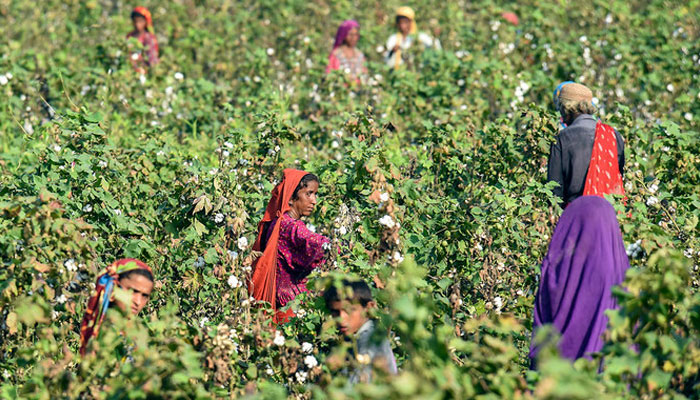Unlocking the potential of women farm workers
LAHORE: Rural women in Pakistan play a crucial role in agriculture, yet they face significant barriers that impact their productivity and economic contributions. Approximately 63 per cent of Pakistani women live in rural areas, where agriculture is the primary source of livelihood.
Women comprise about 60-70 per cent of the agricultural labour force in Pakistan, mainly as unpaid family labour. This rate is notably higher than India, where 42 per cent of women work in agriculture, and Bangladesh, where women make up around 50 per cent of the sector’s labour force.
Most of these women are not formally recognised as paid workers; instead, they are classified as unpaid or family helpers. In Pakistan, fewer than 15 per cent of rural women receive direct payment for agricultural work, and in India and Bangladesh, paid female agricultural labour is also limited and primarily seasonal.
Women in agriculture face unique challenges in Pakistan. Legal and cultural practices often deny them ownership or inheritance rights, which limits their ability to make independent decisions or access financial services. The few women who do own land still face restricted access to quality seeds, fertilisers, and machinery. Financial institutions rarely offer loans or credit facilities to women due to a lack of collateral and traditional biases. Cultural norms restrict women’s autonomy, especially in spending and crop-related decision-making, with male family members often controlling agricultural income and leaving women with little or no say. Lack of land ownership is a major obstacle. Land ownership empowers women with decision-making authority, access to credit, and eligibility for government agricultural subsidies. Without ownership, women cannot leverage their labour to build assets or improve their economic status, leaving them dependent on male relatives.
Access to quality inputs and financing remains a critical challenge. Women’s inability to secure financing due to lack of collateral and gender discrimination limits their productivity and restricts them to subsistence farming or low-profit crops. Addressing this issue through targeted microcredit, subsidies, and training could significantly increase agricultural output and income.
Cultural biases often dictate that male family members control income from agricultural production, which undermines women’s autonomy and incentive to improve productivity. This dependency prevents women from reinvesting income into crop improvements or household needs, limiting both productivity and family welfare. Eliminating these biases through joint family decision-making and community education could economically empower women and improve household outcomes.
Limited access to training and new technologies hinders women’s ability to enhance productivity and adopt modern agricultural practices. Removing these barriers could lead to significant productivity gains. With access to quality inputs, women could substantially boost crop yields. Empowering women in agriculture contributes to household incomes and national GDP, as studies show that women’s income is more likely to be spent on family well-being.
Increased productivity can enhance food security at both the household and community levels. Improved access to training could enable women to diversify into high-value crop cultivation or agribusiness, fostering resilience and economic mobility.
Incorporating women into formal agricultural roles could stimulate growth in multiple ways. With adequate resources, women could help address labour shortages, increase productivity, and stabilise food supply chains. Economically active women are also more likely to invest in education, health, and nutrition, fostering social development and stability. Women often prioritise sustainable agricultural practices that can lead to long-term ecological benefits.
Addressing these barriers could transform the role of women in agriculture, boosting economic growth, household well-being and social equity across Pakistan.
-
 Arden Cho Shares Update On Search For ‘perfect’ Wedding Dress Ahead Of Italy Ceremony
Arden Cho Shares Update On Search For ‘perfect’ Wedding Dress Ahead Of Italy Ceremony -
 Ariana Madix Goes Unfiltered About Dating Life
Ariana Madix Goes Unfiltered About Dating Life -
 Prince William Closes Saudi Arabia Visit With Rare Desert Shot
Prince William Closes Saudi Arabia Visit With Rare Desert Shot -
 'King Charles Acts Fast Or Existential Crisis' Over Andrew Scandal
'King Charles Acts Fast Or Existential Crisis' Over Andrew Scandal -
 Brooklyn Beckham Charging Nearly £300 In Ticket Cost For Burger Festival
Brooklyn Beckham Charging Nearly £300 In Ticket Cost For Burger Festival -
 Prince William Makes Unexpected Stop At Local Market In Saudi Arabia
Prince William Makes Unexpected Stop At Local Market In Saudi Arabia -
 Zayn Malik Shares Important Update About His Love Life
Zayn Malik Shares Important Update About His Love Life -
 Kate Middleton, William Are Holding Onto Their Hats As Worse Gets Threatened: Behind The Veil Of Shame
Kate Middleton, William Are Holding Onto Their Hats As Worse Gets Threatened: Behind The Veil Of Shame -
 British Soap Awards Scrapped Again As ITV Confirms 2026 Hiatus
British Soap Awards Scrapped Again As ITV Confirms 2026 Hiatus -
 Climate Nearing Dangerous Tipping Points, Study Shows
Climate Nearing Dangerous Tipping Points, Study Shows -
 James Van Der Beek, 'Dawson's Creek' Star, Dies At 48
James Van Der Beek, 'Dawson's Creek' Star, Dies At 48 -
 Threads Launches Dear Algo AI Feature To Personalise Feeds In Real Time
Threads Launches Dear Algo AI Feature To Personalise Feeds In Real Time -
 Police Take Action Over Andrew's Ties With Jeffrey Epstein While In UK Office
Police Take Action Over Andrew's Ties With Jeffrey Epstein While In UK Office -
 Courtney Love Makes First Appearance Since New Report On Kurt Cobain's Death
Courtney Love Makes First Appearance Since New Report On Kurt Cobain's Death -
 King Charles Anxious As Uncertainty Grows Over Sarah Ferguson’s Next Move
King Charles Anxious As Uncertainty Grows Over Sarah Ferguson’s Next Move -
 Real Reason Kim Kardashian Is Dating Lewis Hamilton
Real Reason Kim Kardashian Is Dating Lewis Hamilton




